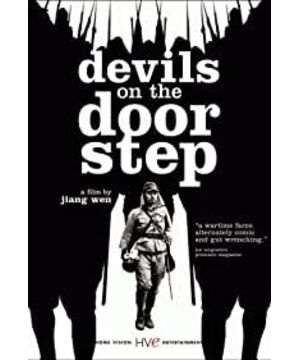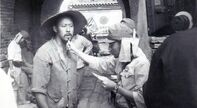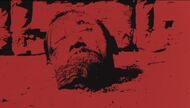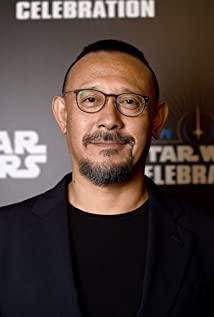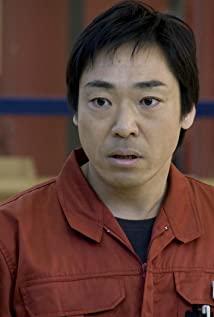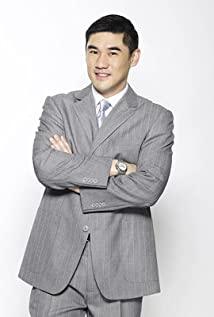As soon as the first few small fragments and lines came out, I called out in my heart. Jiang Wen’s grasp of the characters was too good, and after a few minutes of the shot, Ma Dasan was both honest and cunning. The image of a small farmer who was both timid and fearful but somewhat courageous immediately went live on the screen.
"The Devil Is Coming" has had many twists and turns since its birth, and it is still completely banned. Chinese people who have watched the film, especially those with strong national sentiments, are very disgusted with the image of the Chinese in the film. It has been screened in Japan, and it is said to have caused chaos. After all, the image of the Japanese in the film is cruel and cruel, which is outrageous. In fact, this matter is quite strange. It is said that this kind of movie about the Sino-Japanese War of Resistance is either standing on the Chinese side and speaking to the Japanese people is inaudible, or vice versa. Why is Jiang Wen's film not pleased by either side.
To put it bluntly, it is very simple. We have been brainwashed for too many years. The stories of the older generations will not be mentioned. You can imagine what kind of thinking the generation swept over by the red storm will have. Even our generation has grown up in countless heroic stories. When we were young, we learned from Lai Ning, Lei Feng, and Liu Hulan. A little older was Jiao Yulu and Wang Jinxi. From the red scarf to the Communist Youth League to the Party, we have never escaped from these endless endless things. control. What do you say about the Chinese in the textbook? Hardworking, kind, and brave. How do our soldiers treat the enemy? Tenacious, great, sacrificed, and indomitable. Why is the red scarf red? Stained red by the blood of martyrs! MLGBD, lied to me for many years, and wondered why the blood on the red scarf can't be washed away. Is the blood of a martyr different from my own blood? For this reason, I was ashamed that I was not a martyr.
Jiang Wen yanked freely and yanked off all the red fig leaves. While telling the truth with black and white pictures, he added some absurd and ironic condiments to let you see that Chinese people are not only divided into heroes and traitors, many of them need to play various roles in order to survive. Seeing that auntie with a righteous face, when Ma Dasan came to ask for a white face, she tilted her head, no, or no, eh, are you going to be a traitor? When it was discovered that Ma Dasan did not kill the two prisoners, she also jumped up and accused. Finally, the Japanese sent food, and she laughed happily during the military-civilian reunion.
Not only eight aunts, two necks, one-sword Liu, fifth uncle grandfather, and crazy seven masters are all similar. They are just ordinary Chinese, and they are all the same at the root. They belong to the type of being a bitch and setting up a memorial hall. No matter when you have to put yourself in a right position, even if you do something wrong, you have to put on a beautiful and glamorous label to show that you have a face. This is not to kill the Chinese with a stick. No one can deny the advantages of this ancient nation, such as diligence, wisdom, perseverance, strong endurance, and so on. But Bo Yang also said that good things are good, they are on the table, and they always talk about things. If you can't see the bad, you can't get better. Jiang Wen saw the advantages and the disadvantages, and he blatantly announced them to the world. That's why there are scenes of Chinese children chasing Japanese officers for candy. No wonder those people with excessive national self-esteem looked disgusted.
Speaking of these, it is inevitable to mention a term that has become popular in recent years, "collective unconsciousness." The same group of cowardly and chaotic Chinese people, if they are placed in other areas where armed struggle is in full swing, it is difficult to say whether these people will become another Dong Cunrui. Collective unconsciousness is a universal phenomenon of group psychology. Only individual people will become the part of the iceberg that emerges from the water, thus dominating the rest with their own consciousness and becoming the leader of mass movements. But even if a mass movement is formed, it can only be said to be a collective movement dominated by individual consciousness, and it cannot be called collective consciousness.
When a group of people like Eighth Aunts lived in the enemy and puppet zone, they needed to live in peace with the Japanese army on the one hand, and on the other hand they were trembling, for fear that they would annoy the mild cannibals. The long-term repression has aggravated the collective ideology of thought, and the social structure of the enemy and puppet zone determines the conscious servility of this group of people. Everyone lives only for survival. When the Japanese army delivered food, everyone was grateful and grateful. The Japanese army laughed loudly during the execution. This is basically the group suffering from Stockholm syndrome.
Eric Hoffer said in The Fanatics that no matter how pitiful the situation is, those who respect and fear the surrounding environment will not want to change the status quo. When our lives are precarious and we are completely unable to control our living environment, we will be obsessed with a familiar way of life. We combat deep insecurity by fixing our lifestyle. By this we have created an illusion for ourselves: unpredictability has been tamed by us. The fishermen, herders and farmers who need to watch the sky for food, and primitive people who respect nature are all people who are afraid of change. In their eyes, the world is like a judge with the power of life and death. The same goes for people in extreme poverty. They are afraid of change because they are afraid of the world around them. "
Because human nature itself rejects danger, even economics has a special theory of measuring risk, which will weigh the risks numerically to choose the maximum benefit. Since people are inherently resistant to risks in pursuit of safety, and revolution is precisely a high-risk business, then who will join the road of revolution? First, the middle class with capital taking risks is pursuing higher interests. Second, the proletariat with nothing will retreat and revolution for survival. In the true sense, the peasant class has houses, fields, water and food, and relies on physical strength and celestial phenomena to feed themselves. What they want is stability and peace. Generations of farmers like Ma Dasan and others have been branded in their bones to settle down. As long as they can survive, they will not be driven to ruin, and they will not rise up to resist. This shared deep-rooted conservatism and self-protection model is the collective unconsciousness of Chinese farmers.
From another perspective, the Japanese in the film are mostly the product of collective unconsciousness. Contrary to the unconsciousness of Ma Dasan and their cowardly ego, the Japanese are a collective unconscious of fanatical militarism and nationalism. The dual role of education and propaganda has swallowed their human nature and turned them into machines in war. Hoffer also said that any kind of mass movement must carry the banner of religious movement or nationalism. Only with these two banners can there be sufficient leadership to stir up the flames of a vigorous mass movement. The Japanese militarism has the dual characteristics of religion and nationalism, and at the same time it perfectly matches the extreme and extreme of the Japanese national character. Speaking of this, referring to the national character of the Japanese, it is basically a consensus that this is a schizophrenic nation, as can be seen from its art products, the warmth of warmth to the extreme, and the cruelty is chilling. For this reason, the sudden transition of the Japanese in the movie from their joyful enthusiasm to the slaughter with the bayonet is cruel and bloody, and it seems reasonable and reasonable.
From the collective unawareness of the individual consciousness, it is bound to go through a subversive impact and destructive change before it can break the shackles of the original morality and survival system. For Ma Dasan, the massacre of the whole village constituted him. Revolt against the awakening of consciousness. Therefore, he rushed into the enemy camp, and lunatics generally used an axe to kill Japanese soldiers. Although it was a retaliatory killing, it also faced a tragic ending, but this change was undoubtedly optimistic and romantic. I think this is probably the "national soul" in Jiang Wen's heart, that is, no matter how ignorant and naive the entire national group is, whether it is the ignorant common people, or the Chinese military officers who do not distinguish between good and evil, there is always a power that lurks. Behind the Chinese people, or throwing aside the boundaries of the Chinese people, and spreading it to all human beings, that is the power of goodness and justice in human nature. Even if it was the captive Hanaya Kosaburo, even if he acted as the last executioner, the kindness he formed in the movie with the Chinese is still indelible. A person’s kindness is minimal, but after all, it’s a kind of fire. Continue to burn down.
The tone of the movie is heavy, and no amount of ridicule and irony can change its core. To simply look at this movie from a nationalist perspective is to look down on it and also down on Jiang Wen. Jiang Wen himself said that he did not make this film to promote patriotism. He wanted people to correctly view and recognize history and generate their own thinking. He sounded a wake-up call on us, don't believe it credulously. In the film, don’t believe in the Japanese, but don’t believe in everything that is deceiving. We have been unconscious for too long, and innocent for too long. It's time to touch our own hearts and ask ourselves, which ones are the true selves and which ones are imposed on you by others.
As Mr. Lu Xun said, "However, since a few people are up, you can't say that there is no hope of destroying this iron house."
View more about Devils on the Doorstep reviews


